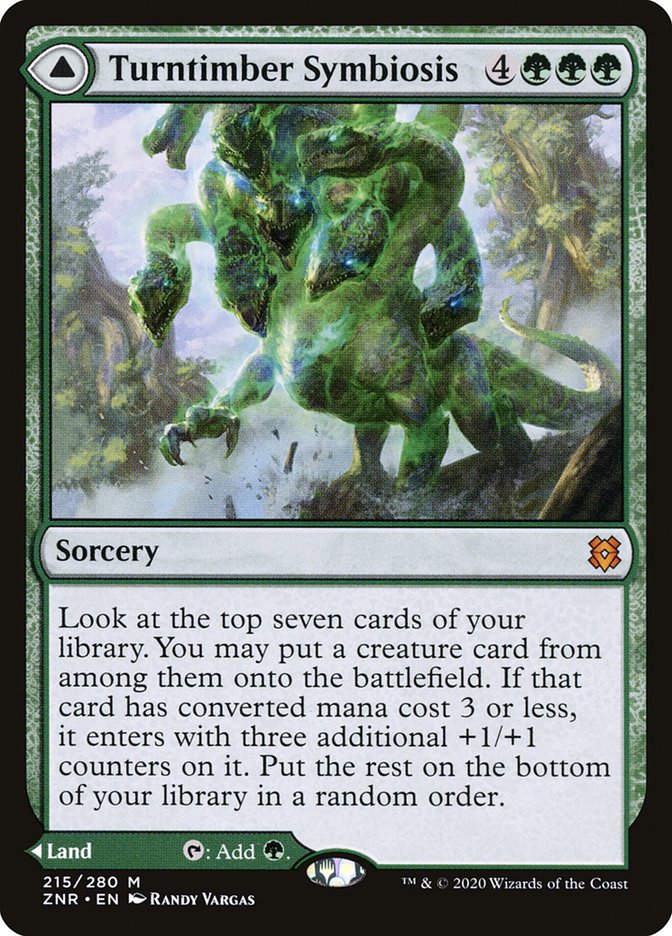

Turntimber Symbiosis {4}{G}{G}{G}
Sorcery
Look at the top seven cards of your library. You may put a creature card from among them onto the battlefield. If that card has mana value 3 or less, it enters with three additional +1/+1 counters on it. Put the rest on the bottom of your library in a random order.
Turntimber, Serpentine Wood
Land
As Turntimber, Serpentine Wood enters, you may pay 3 life. If you don’t, it enters tapped.
{T}: Add {G}.
“The trees here twist around spikes of mana, feeding off the flowing power.”
—Jori En, expedition leader
Illustrated by Randy Vargas
- Standard
- Not Legal
- Alchemy
- Not Legal
- Pioneer
- Legal
- Explorer
- Legal
- Modern
- Legal
- Historic
- Legal
- Legacy
- Legal
- Brawl
- Legal
- Vintage
- Legal
- Timeless
- Legal
- Commander
- Legal
- Pauper
- Not Legal
- Oathbreaker
- Legal
- Penny
- Not Legal
Toolbox
Buy This Card
Notes and Rules Information for Turntimber Symbiosis // Turntimber, Serpentine Wood:
- In the Commander variant, a double-faced card’s color identity is determined by the mana costs and mana symbols in the rules text of both faces combined. If either face has a color indicator or basic land type, those are also considered. (2020-09-25)
- Use the converted mana cost of the creature card as it exists in your library to determine whether it receives +1/+1 counters, ignoring any replacement effects (such as that of Glasspool Mimic) that will change its converted mana cost once it’s on the battlefield. (2020-09-25)
- If a card in a player’s library has {X} in its mana cost, X is considered to be 0. (2020-09-25)
- There is a single triangle icon in the top left corner of the front face. There is a double triangle icon in the top left corner of the back face. (2020-09-25)
- To determine whether it is legal to play a modal double-faced card, consider only the characteristics of the face you’re playing and ignore the other face’s characteristics. (2020-09-25)
- If an effect allows you to play a specific modal double-faced card, you may cast it as a spell or play it as a land, as determined by which face you choose to play. If an effect allows you to cast (rather than “play”) a specific modal double-faced card, you can’t play it as a land. (2020-09-25)
- If an effect allows you to play a land or cast a spell from among a group of cards, you may play or cast a modal double-faced card with any face that fits the criteria of that effect. (2020-09-25)
- The converted mana cost of a modal double-faced card is based on the characteristics of the face that’s being considered. On the stack and battlefield, consider whichever face is up. In all other zones, consider only the front face. This is different than how the converted mana cost of a transforming double-faced card is determined. (2020-09-25)
- A modal double-faced card can’t be transformed or be put onto the battlefield transformed. Ignore any instruction to transform a modal double-faced card or to put one onto the battlefield transformed. (2020-09-25)
- If an effect puts a double-faced card onto the battlefield, it enters with its front face up. If that front face can’t be put onto the battlefield, it doesn’t enter the battlefield. (2020-09-25)
- If an effect instructs a player to choose a card name, the name of either face may be chosen. If that effect or a linked ability refers to a spell with the chosen name being cast and/or a land with the chosen name being played, it considers only the chosen name, not the other face’s name. (2020-09-25)